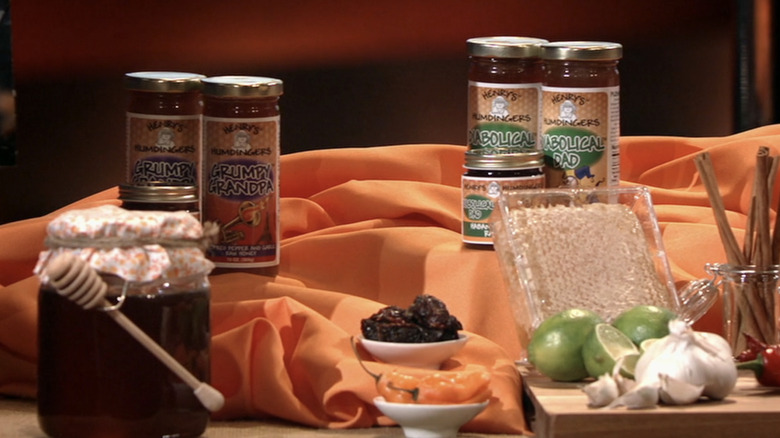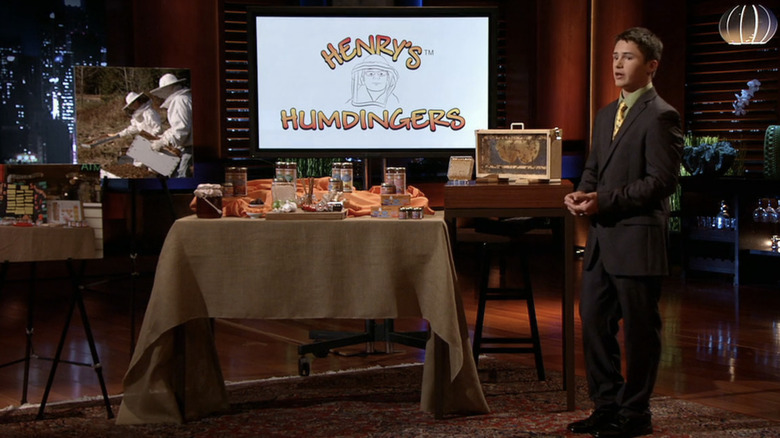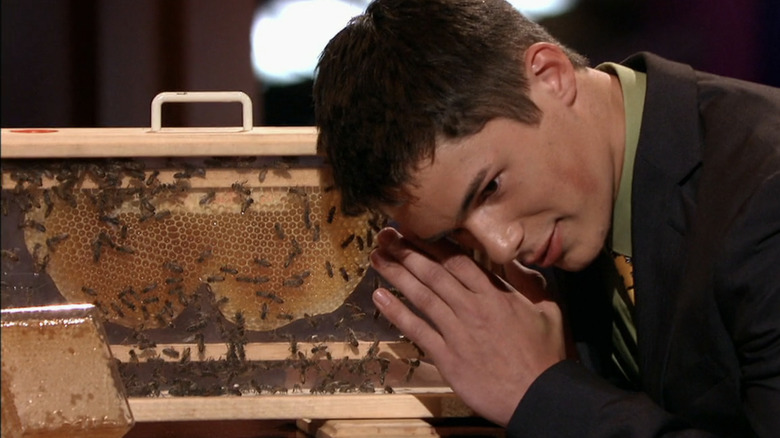Where Is Henry's Humdingers From Shark Tank Today?
If you're going on "Shark Tank," you want to make sure you have a humdinger of an idea. Honey is a good place to start. After all, people can easily replace sugar with raw honey, and honey never goes bad. Such sweet reasons explain why honey has been used ever since ancient times, as both a sweetener and preservative, per Encyclopedia Britannica. It's also long been recognized for its medicinal properties.
So, it's not difficult to see why colony collapse disorder, which causes most worker bees to abandon a hive, quickly became a cause for concern when it was discovered in 2006 (via the EPA). Much research has been done on colony collapse, and several different causes have been proposed — disease, habitat change, mites, pesticides, stress — but the true nature of this phenomenon has long been a mystery. Sadly, without functioning hives, there'd be no more honey.
Of course, sometimes help comes from unexpected places. When 11-year-old Henry Miller learned about colony collapse disorder, he decided to help sustain the bee population by asking for a beehive on his 12th birthday, setting him on a collision course with the Sharks on ABC's "Shark Tank."
Did the Sharks make a deal?
When Henry Miller's beehive started producing more honey than Miller knew what to do with, he opened up a roadside honey stand. Unfortunately, the honey market was already oversaturated, so Miller shook things up and took honey from sweet to spicy! Thus, Henry's Humdingers, LLC was born. Then, when his parents invested $150,000 into his business, Miller became determined to pay them both back. So, when he was 16, this eco-entrepreneur went on "Shark Tank" to secure another $150,000 in exchange for a 25% stake in the company.
The Sharks were moderately impressed. There was no denying Miller was an ambitious and caring kid with a tasty product. However, his sales of $67,000 were immediately underwhelming to the Sharks, many of whom questioned whether a sizable market for Miller's particular product existed. For those reasons, Barbara Corcoran, Kevin O'Leary, and Lori Greiner went out. Yet, Mark Cuban and Robert Herjavec wanted to help Miller attain the capital and consumer awareness he was looking for. Thus, a deal was struck for $300,000 in exchange for 75% of the venture.
Eight years later, Miller was still expressing how much he enjoyed appearing on the show, and most importantly, how much he learned via the experiences his business brought him. "It's not the easiest lifestyle, but it's led me on a lot of rewarding adventures and stuff in my life," Miller said (via Zen Business). "Being on Shark Tank, being able to travel for the company, meeting amazing people along the way ... Personally, it's just pretty crazy."
So, where is Henry's Humdingers today?
Henry's Humdingers closed in 2019
Even on "Shark Tank," nothing's official until it's put in writing. Henry Miller later revealed on the Facebook page for Henry's Humdingers that his deal with Mark Cuban and Robert Herjavec didn't actually close for a variety of reasons. However, he remembers the experience fondly, claiming that everybody involved was wonderful. Cuban even later wrote Miller a reference letter for a college application. Regrettably, though, the disappointing news continues.
In 2019, Miller announced he had closed Henry's Humdingers because it had not made a profit for a significant amount of time. The Millers also lost their family farm, Mrs. Miller was diagnosed with cancer (she thankfully recovered), and their new home was later lost in a fire, along with all of their possessions. On the bright side, Miler attended Washington State University and has hopefully moved on to bigger and better things since graduating. At the time of announcing the closing of Henry's Humdingers, this young eco-entrepreneur still counted himself lucky that he had his family and had successfully raised awareness concerning colony collapse disorder.
To end on a bit of a sweeter note, colony collapse is no longer considered an imminent disaster, as reported by Forbes. Bee colony numbers have stabilized, and the honey industry is doing well, despite hardships like climate change, disease, and malnutrition still posing challenges. Henry's Humdingers is no longer bringing spice to the sweet life, but Miller can nevertheless be proud of what he helped to accomplish.


